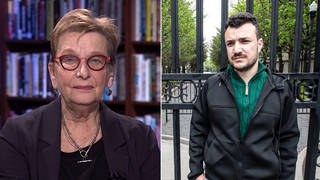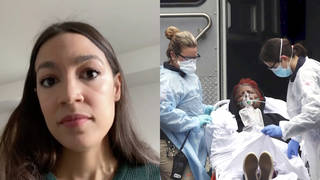
Guests
- Sean Pettyregistered nurse in the pediatric emergency room of a public hospital in the Bronx. He is on the board of directors for the New York State Nurses Association.
A new policy at New York City’s public hospitals requires medical workers who call in sick to produce a doctor’s note. “We know that people just need a mental health day,” says Sean Petty, a registered nurse at a public hospital in the Bronx who is organizing a protest against the policy. “Thousands of us have been exposed. Health workers are the least tested group of people in this city.” Petty is a member of the board of directors of the New York State Nurses Association.
Transcript
AMY GOODMAN: This is Democracy Now!, democracynow.org, The Quarantine Report. I’m Amy Goodman. We end today’s show here in New York City, where the death toll from the coronavirus has passed 11,000. Every night at 7 p.m., New Yorkers take to their balconies, fire escapes, windows to cheer for medical workers and other essential workers on the frontlines of this crisis.
But inside the hospitals, medical staff are continuing to fight for their basic rights and protections while on the job. After a weeks-long effort demanding more personal protective equipment, New York City health workers now have a new challenge ahead of them: a new policy at the city’s public hospitals that requires medical workers who call in sick to produce a doctor’s note.
The directive was sent out Friday by Health & Hospitals Corporation, which runs the 11 public hospitals and has lost at least five nurses to COVID-19. The memo, which was first reported on by news outlet The City, reads, in part, quote, “In some places we have also identified very high rates of call outs and absences that do not appear to be consistent with patterns of COVID infection,” unquote. Medical workers say the policy puts an unnecessary and dangerous burden on already overworked and at-risk staffers who are showing up every day to treat the sick. This afternoon, nurses from Jacobi Medical Center in the Bronx will rally outside the hospital.
We’re joined now by an ER pediatric nurse, Sean Petty, who helped organize today’s protest. He’s a member of the board of directors of the New York State Nurses Association.
Sean, it’s great to have you back with us. Can you talk about this latest memo and the conditions you’re facing in your hospital? And, of course, you work with nurses all over the city.
SEAN PETTY: Yeah. Well, I guess I just want to, first of all, say that, you know, it’s hard to describe the roller coaster that we’ve been on over the last month. And I think we’re just reaching a point, in the last week, where we’re able to breathe a little bit of a sigh of relief. You know, it seems like the COVID cases are slowing into our emergency rooms. We’re becoming more successful at extubating patients and keeping patients alive. And we’re able — at Jacobi, we’re able to get transfers from other hospitals that have been overburdened. So we just are breathing a sigh of relief.
And it’s given us a moment to pause and think about just how traumatic and devastating this last month has been for our lives. We’ve lost co-workers. We’ve lost family members. We’ve lost other loved ones. Our families and our communities have gone through probably one of the most traumatic months of our lives. And we have gotten sick by the thousands.
And so, this last — just as we are able to take a breath and think about all this and process it, getting this kind of treatment from administrators in our hospital system, who sit safely behind desks and who look at spreadsheets, that is a major dishonorable, disrespectful act.
AMY GOODMAN: Let me get some facts out there. The Guardian reports, quote, “The number of healthcare workers who have tested positive for the coronavirus is probably far higher than the reported tally of 9,200,” U.S. officials saying “they have no comprehensive way to count those who lose their lives trying to save others. The Centers for Disease Control … released the infection tally on Tuesday and said 27 health worker deaths have been recorded, based on a small number of test-result reports. Officials stressed that the count was drawn from just 16% of the nation’s Covid-19 cases, so the true numbers of healthcare infections and deaths are certainly far higher.” So, practically, what does this mean? You’re home. You have a sore throat. You start coughing. You took off for a few days. You have to get a doctor’s note?
SEAN PETTY: Yeah. We have to get a doctor’s note for every single time we decide to stay home for whatever we’re experiencing, whether that — we know that COVID-19 symptoms can last for over a month and can come on and off. We know that being exposed and working in these challenging conditions exacerbate already preexisting conditions which nurses suffer, whether that’s migraine headaches, diabetes, other health conditions. We know that people just need a mental health day. We know that people are in a whole range of health conditions. We know that thousands of us have been exposed. We have never been — healthcare workers are the least tested group of people in this city. And that —
AMY GOODMAN: Now, this is a critical point, Sean.
SEAN PETTY: Yeah.
AMY GOODMAN: If you can explain what you’re talking about? So they’re saying you need a doctor’s note. But if you’re at work and you don’t feel well, can you demand a test?
SEAN PETTY: We currently, as of last week, can finally get testing as healthcare workers. But for the last month prior to that, we have been denied those tests. So, the thousands of — the thousands of healthcare workers, the 77% of our members who have been polled who have been exposed to this coronavirus, for the past month prior to this week, this last week, we have not been able to get tested. So, they have no idea who is actually COVID-positive and who is not. Their actual reported numbers, whatever they’re looking at on their spreadsheets, have to be massively undercounted. So, the idea they can look at a statistic and determine how many people are calling out sick, versus the amount of people that they think are infected, is absolutely absurd.
AMY GOODMAN: I mean, they should be encouraging you, “Do not come into work if you are showing symptoms.” I mean, we already know that it seems that you’re most contagious in the two days before you start showing symptoms. So, for God’s sakes, if you’re showing symptoms and you’re going to be up close with patients treating them…
SEAN PETTY: And that’s been the problem from the beginning, is that every single policy that’s been implemented by the federal government, the state, the city, has been based on shortages, not based on science. And so you have a situation where this policy is based on shortages, it’s not based on science. So, on the one hand, we have our system telling us, you know, “We need to make sure you’re actually sick. You need to go get a doctor’s note. You need to overburden an already overburdened healthcare system for unnecessary paperwork. You need to seek out a doctor’s note. If you can’t get one over the phone, you need to go out into the world, expose yourself, be exposed by other people, and obtain this unnecessary paperwork.” And in a context where we have already been exposed, you know, in some of the most profound ways, and as you —
AMY GOODMAN: So, you’re protesting today outside Jacobi in the Bronx?
SEAN PETTY: Yeah. We’ve tried to go the official routes. We’ve been talking to high-level officials at the city for the last week, expressing our concerns, telling them exactly how we feel about this and exactly what this means to nurses — who have given everything to fight this virus, who have given their entire physical and emotional lives to fight this virus over the last month — and what this means to us, and exactly what’s wrong with their accounting of the situation. And they have still refused to budge. We’ve talked to them practically every day for the last five days, and they still have not listened to us. So, we have to speak out in a more loud and effective way.
AMY GOODMAN: Sean, I wanted to quickly ask you about an issue that de Blasio raised, the mayor of New York, and many others: the horror of the hundreds of people daily who are dying at home, so many of them undocumented immigrants. De Blasio said something like 200 to 300 people a day, when the average before was something like 25, even afraid to go to hospitals because they might meet ICE or something like this.
SEAN PETTY: That’s right.
AMY GOODMAN: You’re in the public hospital system, the hospital system of last resort, often first resort for the poor. A final comment on this?
SEAN PETTY: Well, the public health system is the most critical piece of infrastructure in this country. And we have the largest public healthcare system left in this country, after decades of public health systems being eroded. We are the only healthcare system that guarantees healthcare for undocumented immigrants. And so, to continue these policies that will exacerbate our staffing crisis, will demoralize our nurses, will — if we’re going to set up a healthcare system —
AMY GOODMAN: We have 10 seconds.
SEAN PETTY: If we’re going to set up a healthcare system in the wake of this crisis, our sacrifice needs to be respected, and we need to be able to recruit and retain a robust healthcare staff after this crisis is over. So, we have to —
AMY GOODMAN: We have to leave it there, Sean. I want to thank you so much for being with us. Sean Petty, registered nurse in the pediatric emergency room of a public hospital in the Bronx, member of the board of directors of the New York State Nurses Association.
I want to end with this tweet from Congressmember Ayanna Pressley, who wrote, “Went to get a replacement inhaler today. Told me generic is sold out with a wait list. So my only option is one that cost $175. My co pay for the other is [usually] $10. I can afford the increase but millions wont be able to. Literally what folx need to breathe/ live is political,” she said.
That does it for our show. You can sign up for our daily digest every day, get The Quarantine Report in your email. Text the words “democracynow” — one word — to 66866. Or you can go to our website at democracynow.org and sign up there.
Democracy Now! is working with as few people as possible on site, the majority of our remarkable team working from home. We thank all of you, and special thanks to general manager Julie Crosby. I’m Amy Goodman. Thanks so much for joining us. Be safe.












Media Options